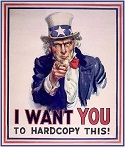|
1850-1917 |
|
|
1850-1917 |
|
|
"If a man continually blusters . . . a big stick will not save him from trouble; and neither will speaking softly avail, if back of the softness there does not lie strength [and] power. If the boaster is not prepared to back up his words, his position becomes absolutely contemptible."  |
| CONTENT OUTLINE |
currently unavailable. |
| OVAL OFFICE |
|
|
| WHAT 'S MY LINE? |
|
|
|
| PRIMARY SOURCES / DOCUMENTS |
|
 |
| EXTENDED RESPONSE |
| 1. "The closing of the frontier in 1890 had a profound effect on the social and economic development of the United States in the succeeding twenty years." Assess the validity of this statement. 2. Outline the arguments presented in the debate over the American acquisition of an overseas empire and explain why the expansionists prevailed. 3. Compare the debates that took place over American expansionism in the 1890s with those that took place in the 1840s, analyzing the similarities and differences in the debates of the two eras. 4. "The Spanish-American War is often marked as the date for the emergence of the United States as a world power." Evaluate this statement. 5. "The Spanish-American War was a premeditated affair resulting from a deliberately calculated scheme of robbery on the part of a superior power against a weak and defenseless neighbor." Assess the validity of this statement. 6. Compare the "gunboat diplomacy" of President Theodore Roosevelt, the "dollar diplomacy" of President William Howard Taft, and the "moral diplomacy" of President Woodrow Wilson. Which of the theories do you think was most effective? |
| CHEAT SHEET |
|
| REWIND & FAST FORWARD |